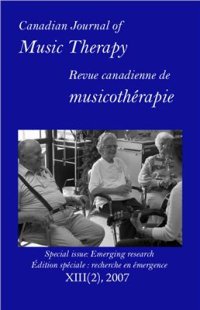
Ebook: Canadian Journal of Music Therapy, XIII
Author: Kirkland K. Bargiel M.
- Genre: Psychology
- Tags: Психологические дисциплины, Психокоррекция, Арт-терапия, Музыкотерапия
- Language: English
- pdf
Kirkland K., Bargiel M., Canadian Journal of Music Therapy, XIII, 2007
The official Journal of the Canadian Association for Music TherapySpecial issue: Emerging research - Édition spéciale : recherche en émergenceMusic therapy is a field of never-ending discoveries, a field that defies
simple explanations of why and how it works. If we consider the
advice of Csikszentmihalyi to aim for complexity, to increase the
complexity of what you enjoy, to make time for reflection and relaxation, and
to write down what you did today,1 then we are preparing the way for research.
It may be just as well we will never fully be able to dissect the beauty, science
and mystery of this wondrous thing that is far beyond a phenomenon that
is heard but can also be touched, experienced, witnessed, felt, imagined, and
created: music. We have a deep yearning to better understand its therapeutic
values of music and our integrated roles as clinicians. It is often said that
music is non-verbal. Others call it para-verbal and pre-verbal, while there are
those who say it is a universal language. The poet Anne Porter might call it
An altogether different language.2 No matter how it is termed, we turn to
language to translate or transcribe that which has unfolded through the music.
I thank Noreen Donnell for suggesting a special issue on emerging research.
She recognized, like others, that more and more Canadian music therapists are
pursuing advanced training, yet many of their findings have gone unpublished
once the thesis is done or the dissertation defended.
The official Journal of the Canadian Association for Music TherapySpecial issue: Emerging research - Édition spéciale : recherche en émergenceMusic therapy is a field of never-ending discoveries, a field that defies
simple explanations of why and how it works. If we consider the
advice of Csikszentmihalyi to aim for complexity, to increase the
complexity of what you enjoy, to make time for reflection and relaxation, and
to write down what you did today,1 then we are preparing the way for research.
It may be just as well we will never fully be able to dissect the beauty, science
and mystery of this wondrous thing that is far beyond a phenomenon that
is heard but can also be touched, experienced, witnessed, felt, imagined, and
created: music. We have a deep yearning to better understand its therapeutic
values of music and our integrated roles as clinicians. It is often said that
music is non-verbal. Others call it para-verbal and pre-verbal, while there are
those who say it is a universal language. The poet Anne Porter might call it
An altogether different language.2 No matter how it is termed, we turn to
language to translate or transcribe that which has unfolded through the music.
I thank Noreen Donnell for suggesting a special issue on emerging research.
She recognized, like others, that more and more Canadian music therapists are
pursuing advanced training, yet many of their findings have gone unpublished
once the thesis is done or the dissertation defended.
Download the book Canadian Journal of Music Therapy, XIII for free or read online
Continue reading on any device:

Last viewed books
Related books
{related-news}
Comments (0)